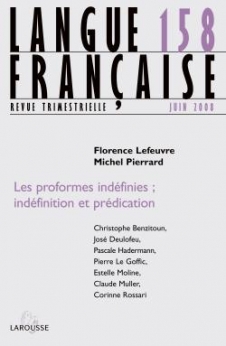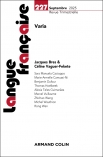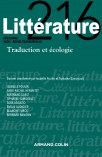
Langue française n° 158 (2/2008)
Pour acheter ce numéro, contactez-nous
Recevez les numéros de l'année en cours et accédez à l'intégralité des articles en ligne.
The present study aims at characterizing the status of the element que in equative constructions, as represented by the examples (1) and (2): (1) a) Robert est aussi intelligent que Maria. (2) a) Robert boit autant qu’il mange. This use of que seems to be located at the fringe of the already widely described properties of the indefinite proform (PI) in interrogative or relative clauses. This use can obviously not simply be reduced to an instantiation of the conjunction. The analysis of the functioning of equative que will lead to three conclusions concerning its status and its role in the connection of clauses: a) Que will be characterized as a scalar adverbial, restricting the range of the equality/ superiority/ inferiority with the degree of the standard it introduces. b) Que operates within a correlative relation and connects a secondary predication to an element of the predicative structure of the prior predication, but without reclassifying it. c) If a mutual dependence of the two components of the marker is needed to express the equative function, que is still syntactically governed and semantically directed by the first component (aussi/autant).

